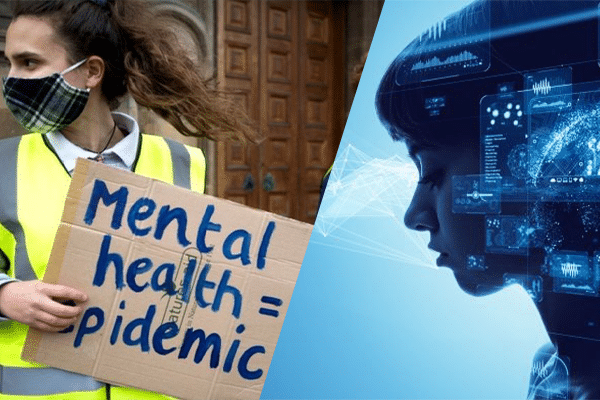
Mental Health Pushed to Go Digital After COVID-19
With the COVID-19 pandemic highlighting the importance of mental health, the role of digital has never been more important
Words by Dr. Ryan Grech and Dr. Dylan Attard, Clinical & Health Tech Advisors for MedTech World and two of the co-founders of Digital Health Malta.
In the previous article, Dr. Ryan Grech and Dr. Dylan Attard discussed AI in healthcare and its enormous potential to finally reach true health equality.
It’s been just over a year since the WHO declared the COVID-19 pandemic. We are only just now seeing the light at the end of the tunnel thanks to vaccination programmes which were a well-needed piece of ammunition against the deadly virus. And as countries continuously improve their vaccination rates, we should be cautiously optimistic that life will return to some form of normality. Whilst this is extremely good for the economy and it will allow our hospitals to return to dealing with the waiting lists that COVID-19 has created, one thing is important to keep in mind, the psychological effects brought by the pandemic will likely outlive any economic shortfall due to the pandemic. In January 2021, in the US alone, 41% of adults have reported symptoms of anxiety and/or depressive disorders, a four-fold increase from 2019 [1]. Just like you, we think that is worrying.
We can all agree that even though most countries are promising huge injections into mental health, most likely, it will still fall short of what is needed. That is why we think that digital health can have a huge impact here. From telehealth to coaching and meditation apps, we think that these solutions can alleviate pressures from the national health services whilst making mental health accessible to all. Not only that but in an age where we, unfortunately, may still stigmatise individuals who suffer from mental health disorders, for some individual the privacy of their own home may mean that they accept getting the help that they need.
What are the different ways that digital can help?
Online self-help / Smartphone app mental health guides
Not everyone will necessarily feel that they need to speak to someone professional to get them through a rough patch, or they might not feel they are ready to. And whilst some individuals may feel comfortable speaking to their friends about mental health others are afraid to do so. Online self-help from reputable sources or verified mindful applications that guide individuals through stress and anxiety are a great alternative.
There are no waiting lists for these resources, you can use them in the privacy of your own home and you can work through them at your own pace. Ultimately, individuals learn more about mental health, techniques to help cope and may also make individuals realise what help they need.
Telemedicine
Telemedicine has been a must over the pandemic and has resulted in more awareness of its capabilities. Some people remain sceptical about the fact that a doctor does not examine you and perhaps that may be the biggest barrier to its complete adoption. One advantage telehealth has in the context of mental health is that for the most part, a mental healthcare professional does not need to examine a patient.
Telemedicine allows the delivery of interactive interventions for preventing and treating depression, anxiety, and other mental health problems. For example, if we take cognitive behavioural therapy (CBT) which is typically undertaken over several weeks or months patients can do this at their convenience with their healthcare professional of choice from the comfort of their own home. Being in one’s home may also help a patient feel more at ease and open. In fact, the National Institute for Health and Care Excellence recommends integrating the use of technology for the treatment of depression and anxiety [2]. As detailed in the guidance, blended care can be an incredibly useful model of mental health delivery.
Chatbots
Sometimes all you want to do is just talk. And that is exactly what chatbots are for. Chatbots can be an effective way of helping individuals talk through their problems and also may be helpful in the delivery of CBT. They are always on and available at any time of the day. A recent meta-analysis and systematic review have shown that chatbots have the potential to improve mental health. Whilst the evidence is not yet sufficient to say that their effect is clinically important, two studies that reported clinically safety concluded that chatbots are safe to be used in mental health [3]. Whilst we acknowledge that further studies are needed to draw solid conclusions, the rapid improvement in natural language processing makes us inclined to believe that we’re well towards these chatbot therapists providing a meaningful impact on the mental wellbeing of their users. Admittedly, sometimes all you need is to talk about a problem to just feel better.
Whilst the above list is certainly not exhaustive and we touched mostly on solutions for anxiety and depression, we think that the examples that we’ve listed here enable an always available mental health service with a low-cost barrier. Remember, some individuals find it difficult to leave home because of agoraphobia or social phobia who are likely to need mental health professional assistance and thus once again digital pushes towards accessible help.
Overall, we think that the above will not only prove to be a more cost-effective approach to mental health but will also ultimately result in a healthier population as help is always available via a multifactorial approach.
[1] The Implications of COVID-19 for Mental Health and Substance Use. (2021). Retrieved 16 March 2021, from https://www.kff.org/coronavirus-covid-19/issue-brief/the-implications-of-covid-19-for-mental-health-and-substance-use/
[2] Guidance | Common mental health problems: identification and pathways to care | Guidance | NICE. (2021). Retrieved 16 March 2021, from https://www.nice.org.uk/guidance/cg123/chapter/1-Guidance
[3] Abd-Alrazaq, A., Rababeh, A., Alajlani, M., Bewick, B., & Househ, M. (2020). Effectiveness and Safety of Using Chatbots to Improve Mental Health: Systematic Review and Meta-Analysis. Journal Of Medical Internet Research, 22(7), e16021. doi: 10.2196/16021




